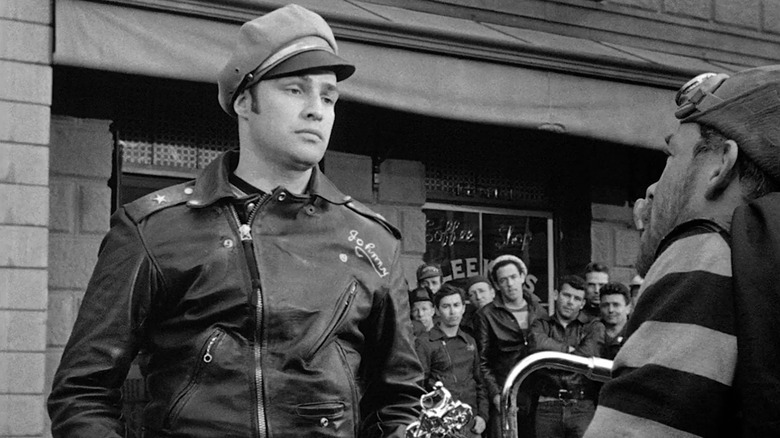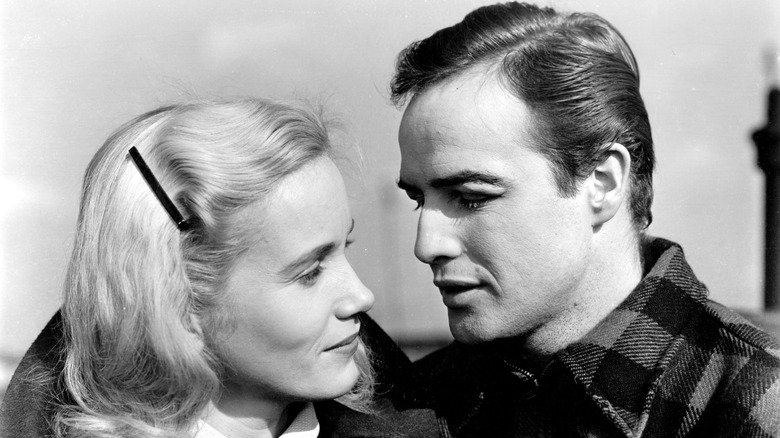The Marlon Brando Movie With A Near-Perfect Rotten Tomatoes Score
In László Benedek's 1953 crime drama "The Wild One," a young woman dancing with a member of the Black Rebels Motorcycle Club asks their leader, the pouty-lipped Johnny (Marlon Brando), what he's rebelling against, to which Johnny replies, unsmiling, "Whaddya got?" The most famous line of Brando's career up there with "I'm gonna make him an offer he can't refuse," it also might as well have been a mission statement for the notoriously temperamental, wild card actor.
Brando's career trajectory reflected his disposition. Where the 1950s saw him collecting accolades and awards left and right, the actor's ill-reputable conduct overshadowed practically everything he did onscreen in the decade that came after. It wasn't until the '70s that Brando's legacy as a screen icon was restored, even as he continued to try and sabotage himself with his unpredictable behavior and seeming apathy towards many of the films he worked on. His antics notwithstanding, the man's oeuvre is littered with incredible works of art, spanning the gamut from Elia Kazan's volatile "A Streetcar Named Desire" film adaptation to Francis Ford Coppola's mobster masterpiece "The Godfather" and the grandpappy of the modern blockbuster, Richard Donner's "Superman."
Even Brando's misses tended to be historic, as was the case with the car-crash-in-motion that was John Frankenheimer's doomed H.G. Wells re-imagining, "The Island of Dr. Moreau."
As you've probably gathered, "Dr. Moreau" is not the Brando film with a near-perfect score on Rotten Tomatoes, nor is it Arthur Penn's "The Missouri Breaks" (the "Bonnie and Clyde" director's mostly-forgotten 1976 revisionist Western pairing Brando against Jack Nicholson). The real culprit is the Best Picture winner that netted Brando his first-ever Oscar for acting — a victory that, in no small amount, can be credited to his delivery of one of the most emotionally-naked monologues ever put to screen.
On the Waterfront
1954's "On the Waterfront" marked Brando's third time working with Kazan after "A Streetcar Named Desire" and "Viva Zapata!" and only the sixth movie he'd starred in as an actor. Brando was at the peak of his sensuality as the wounded hunk Terry Malloy, a former prize fighter turned dockworker whose reawakened conscience — prodded by his growing feelings for Eva Marie Saint's Edie Doyle — compels him to speak out against his corrupt union bosses. "On the Waterfront" is a film whose classic status is well-deserved, albeit tainted by the actions of its director, who infamously testified to the House Un-American Activities Committee in 1952. Kazan's naming of individuals with ties to Communism as part of the Second Red Scare was a disgrace and runs counter to the pro-workers' rights message at heart of "On the Waterfront" (even if Kazan himself felt the opposite to be true).
Much as the film's performances garner the lion's share of attention, along with Brando's "I could've been a contender" confession opposite Rod Steiger, "On the Waterfront" is also a masterclass in filmmaking. Take the scene where Terry tells Edie what happened to her brother Joey and his complicity in Joey's grim fate, their conversation gradually being drowned out by the blasting whistle of a boat from the nearby docks. As the film cuts back and forth between increasingly intimate closeups of the pair, Brando's pained expression and the growing look of anguish and betrayal on Saint's face say more than any scripted words of dialogue could ever hope to.
Unsurprisingly, "On the Waterfront" holds a practically flawless 99% critics score on Rotten Tomatoes from 117 reviews, only one of which is negative (and its author has every right to feel that way). If that's what it takes to convince more people to finally seek this film out, then so be it.

